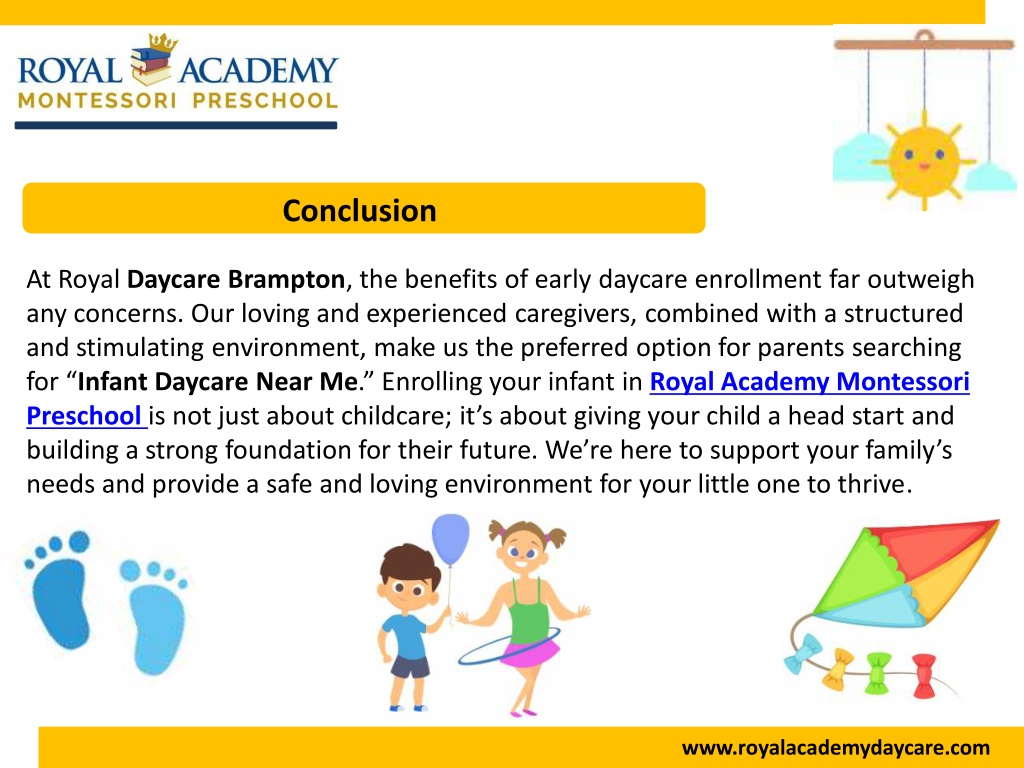Is Daycare Too Soon? A Parenting Expert's Perspective On Infant And Toddler Care

Table of Contents
Developmental Considerations: The Impact of Early Daycare on Infant and Toddler Development
The decision of whether or not to enroll your child in daycare often hinges on its potential impact on their development. Let's examine the key developmental areas:
Social-Emotional Development
Early daycare provides unparalleled opportunities for social-emotional growth. Infants and toddlers in daycare settings are exposed to a diverse range of social interactions, fostering crucial skills.
- Improved social skills: Children learn to share, cooperate, negotiate, and resolve conflicts with peers, skills vital for future success.
- Enhanced emotional regulation: Daycare environments often provide structured activities that help children learn to manage their emotions, fostering self-soothing techniques and emotional intelligence.
- Increased self-confidence: Successfully navigating the social dynamics of a daycare setting builds confidence and independence.
- Earlier language development: The constant interaction with peers and caregivers in a daycare setting accelerates language acquisition.
Cognitive Development
The impact of daycare on cognitive development is a subject of ongoing discussion. While some worry about overstimulation, others emphasize the benefits of structured learning.
- Exposure to structured learning activities: Many daycare centers offer age-appropriate activities designed to stimulate cognitive growth through play and exploration.
- Accelerated learning in certain areas: Early exposure to different learning styles and activities can lead to accelerated development in areas like language, problem-solving, and creativity.
- Potential for overstimulation: It's crucial to choose a daycare with a balanced approach, avoiding excessive screen time and ensuring ample opportunities for free play and rest.
- Curriculum Considerations: Research the daycare's curriculum. Does it emphasize play-based learning? Does it align with your values and approach to early childhood education?
Physical Development
Daycare settings frequently offer advantages for physical development, especially for gross and fine motor skills.
- Access to larger play spaces and equipment: Daycare centers typically provide more space and a greater variety of play equipment than many home environments, encouraging physical activity and exploration.
- Improved gross motor skills: Running, climbing, jumping, and other large muscle activities are often integrated into the daily routine.
- Enhanced fine motor skills: Activities like drawing, puzzles, and building blocks contribute to the development of hand-eye coordination and dexterity.
- Increased risk of illness: Daycares are environments where illnesses can spread easily. Choosing a daycare with strong hygiene protocols and open communication about illnesses is critical.
The Practicalities of Choosing Infant and Toddler Daycare
Beyond developmental benefits, practical considerations play a huge role in choosing a daycare.
Finding Quality Daycare
Selecting a high-quality daycare is crucial. Prioritize the following factors:
- Accreditation: Look for nationally recognized accreditation, signifying adherence to high standards of care and education.
- Teacher-child ratios: Lower ratios generally mean more individual attention for your child.
- Safety measures: Assess the physical safety of the facility, including security protocols, emergency procedures, and age-appropriate equipment.
- Curriculum: Inquire about the daycare's approach to learning, ensuring it aligns with your values and expectations.
- Reviews and Visits: Always visit potential daycares and check online reviews from other parents.
Cost and Logistics of Daycare
Daycare can be expensive. Carefully consider these financial and logistical elements:
- Budgeting: Daycare costs vary widely. Create a realistic budget to accommodate this significant expense.
- Employer-sponsored benefits: Explore if your employer offers childcare assistance programs.
- Waitlists: Many popular daycares have lengthy waitlists. Start your search early.
- Alternatives: Consider alternatives such as in-home care or family assistance if daycare costs prove prohibitive.
The Transition to Daycare
Easing your child's transition is vital. Employ these strategies:
- Gradual introduction: Start with short visits to familiarize your child with the environment before full-time enrollment.
- Establishing routines: Maintain consistent routines at home and daycare to provide stability and predictability.
- Consistent communication: Maintain open communication with daycare staff to ensure a smooth transition and address any concerns.
- Parental support: Your support and reassurance are crucial during the adjustment period for both you and your child.
Addressing Parental Concerns About Early Daycare
Addressing anxieties surrounding daycare is essential for a positive experience.
Separation Anxiety
Separation anxiety is common. Here's how to manage it:
- Consistent routines and reassuring goodbyes: Establishing predictable routines and offering comforting goodbyes can significantly reduce anxiety.
- Signs of struggle: Be aware of signs that your child is struggling, such as excessive crying, clinging, or withdrawal. Seek guidance from daycare staff or a professional if needed.
Illness and Infection Control
Increased exposure to illness is a legitimate concern. These strategies can mitigate the risk:
- Hygiene practices: Ensure your child practices good hygiene, and check the daycare's hygiene protocols.
- Vaccination: Ensure your child is up-to-date on vaccinations to protect against common childhood illnesses.
- Communication with staff: Keep the daycare staff informed about your child’s health status and any symptoms.
- Keeping your child home: Don't hesitate to keep your child home if they are unwell.
Finding the Right Fit
The "right" time for daycare is subjective.
- Child's temperament: Consider your child's temperament and personality when making your decision.
- Family needs and resources: Weigh your family's specific needs and resources.
- Trust your instincts: Choose a setting that feels comfortable and supportive.
Conclusion
The decision of whether daycare is "too soon" for your infant or toddler is deeply personal. While early childcare can offer valuable developmental benefits, it’s crucial to weigh these advantages against the practical considerations and potential challenges. By carefully considering your child's developmental needs, researching quality daycare options, and addressing your concerns proactively, you can make an informed choice that best supports your family's well-being. Remember, there's no one-size-fits-all answer – the best timing for daycare depends entirely on your unique circumstances. Continue researching daycare for infants and toddlers to find the perfect fit for your child’s needs and your family's lifestyle.

Featured Posts
-
 Luxury Carmakers Face Headwinds In China Analyzing The Market Slowdown
May 09, 2025
Luxury Carmakers Face Headwinds In China Analyzing The Market Slowdown
May 09, 2025 -
 Alpines Clear Message To Doohan F1 News Update
May 09, 2025
Alpines Clear Message To Doohan F1 News Update
May 09, 2025 -
 Policia Britanica Prende Mulher Que Se Diz Madeleine Mc Cann
May 09, 2025
Policia Britanica Prende Mulher Que Se Diz Madeleine Mc Cann
May 09, 2025 -
 Is This Show The Best Replacement For Roman Potential Spoilers Ahead Of Season 2
May 09, 2025
Is This Show The Best Replacement For Roman Potential Spoilers Ahead Of Season 2
May 09, 2025 -
 Micro Strategy Vs Bitcoin Which Is The Better Investment In 2025
May 09, 2025
Micro Strategy Vs Bitcoin Which Is The Better Investment In 2025
May 09, 2025
Latest Posts
-
 Trumps Tariffs A 174 Billion Hit To The Net Worth Of Global Billionaires Including Buffett And Bezos
May 09, 2025
Trumps Tariffs A 174 Billion Hit To The Net Worth Of Global Billionaires Including Buffett And Bezos
May 09, 2025 -
 The Correlation Between Trumps Presidency And Elon Musks Net Worth First 100 Days
May 09, 2025
The Correlation Between Trumps Presidency And Elon Musks Net Worth First 100 Days
May 09, 2025 -
 Trump Tariffs And The Billionaire Wealth Decline A 174 Billion Impact
May 09, 2025
Trump Tariffs And The Billionaire Wealth Decline A 174 Billion Impact
May 09, 2025 -
 Tracking Elon Musks Net Worth A 100 Day Study Of The Trump Administration
May 09, 2025
Tracking Elon Musks Net Worth A 100 Day Study Of The Trump Administration
May 09, 2025 -
 Trumps Tariffs 174 Billion Wipeout For Top 10 Billionaires
May 09, 2025
Trumps Tariffs 174 Billion Wipeout For Top 10 Billionaires
May 09, 2025
